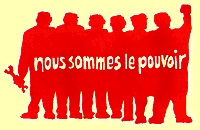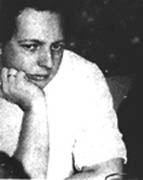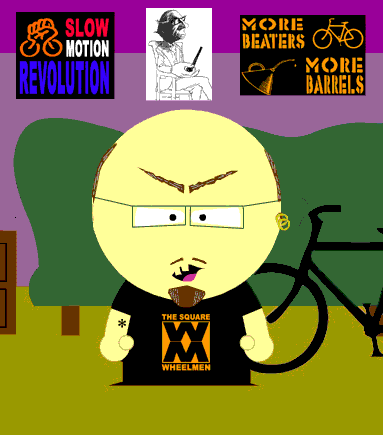their passions a quotation
w/apologies
to Oscar Wilde
to Oscar Wilde
 As I hit the mid-February dull-drums, I've been turning my head towards spring with a little restoration project. It's not only keeping me from self-medicating the darkness away in my local neighborhood joint. There's nothing like scouring several decades worth of rust off steel rims for ruminating about the vélotariat.
As I hit the mid-February dull-drums, I've been turning my head towards spring with a little restoration project. It's not only keeping me from self-medicating the darkness away in my local neighborhood joint. There's nothing like scouring several decades worth of rust off steel rims for ruminating about the vélotariat.In other words, where the hell did the mass come from and where the hell is it going?Why do researchers who've never been on Critical Mass write as if it just popped out of nowhere on the streets of America? Why do they typically recycle masser statements about the anarchy and celebration without ever going deeper beneath the surface? And why do they never explain the mass's staying power, now in it's second decade and spreading around the world?
 The simple answer is that Critical Mass began in 1992 in San Francisco. Seven years later, it appeared in Chicago. Most academic research concludes that it's the anarchistic step-child of the aging hippies and student protesters of the 60s. That's usually where it ends.
The simple answer is that Critical Mass began in 1992 in San Francisco. Seven years later, it appeared in Chicago. Most academic research concludes that it's the anarchistic step-child of the aging hippies and student protesters of the 60s. That's usually where it ends. Although a good start, refusing to go further ignores the rich history of bike activism both during and after the heyday of counter-culture America. In Chicago, Keith Kingbay was bugging Mayor Daley the Elder for bike lanes which first went in the early 1970s. Hippy longhair? Wild-eyed radical? Not in the least: Keith was the Cycling Activities Director for the Schwinn Bicycle Company and member of President Nixons's Council on Physical Fitness.
Although a good start, refusing to go further ignores the rich history of bike activism both during and after the heyday of counter-culture America. In Chicago, Keith Kingbay was bugging Mayor Daley the Elder for bike lanes which first went in the early 1970s. Hippy longhair? Wild-eyed radical? Not in the least: Keith was the Cycling Activities Director for the Schwinn Bicycle Company and member of President Nixons's Council on Physical Fitness. So where to go from here? On to Humboldt Park. Lula's was getting ready for the dinner rush. I decamped to the Black Beetle Bar & Grill in Humboldt Park. There I discovered an obscure (to Americans at least) Parisian group that gave the May 1968 student revolt its intellectual uhmpf. And quite surprisingly, Kingbay seems to have been familiar with many of their essays.
So where to go from here? On to Humboldt Park. Lula's was getting ready for the dinner rush. I decamped to the Black Beetle Bar & Grill in Humboldt Park. There I discovered an obscure (to Americans at least) Parisian group that gave the May 1968 student revolt its intellectual uhmpf. And quite surprisingly, Kingbay seems to have been familiar with many of their essays. Led by Guy Debord, The Situationists came down hard on Western society. France had finally emerged from the poverty and despair of the post-WWII period. Rebuilding war-ravaged cities and villages was almost complete. Unemployment was virtually non-existent. Under De Gaulle, France was a serious US Cold War partner. The baby-boom generation was flooding the universities ... and it was bored, angry, and primed for action.
Led by Guy Debord, The Situationists came down hard on Western society. France had finally emerged from the poverty and despair of the post-WWII period. Rebuilding war-ravaged cities and villages was almost complete. Unemployment was virtually non-existent. Under De Gaulle, France was a serious US Cold War partner. The baby-boom generation was flooding the universities ... and it was bored, angry, and primed for action. In contrast to today's conservative revisions of history, the Situationists were much more than a group of spoiled middle class kids. The French were in Algeria. The Soviets were in Czechoslovakia. The US was in Viet Nam. Countries in Africa and Latin America were struggling for national independence or true sovereignty from former colonial masters. Western governments, as well as the traditional opposition parties that did little real opposing, demanded loyalty, rather than questions, from their supporters. They specifically demanded young people to Sois Jeune et Tais Tois, or Be young and shut up.
In contrast to today's conservative revisions of history, the Situationists were much more than a group of spoiled middle class kids. The French were in Algeria. The Soviets were in Czechoslovakia. The US was in Viet Nam. Countries in Africa and Latin America were struggling for national independence or true sovereignty from former colonial masters. Western governments, as well as the traditional opposition parties that did little real opposing, demanded loyalty, rather than questions, from their supporters. They specifically demanded young people to Sois Jeune et Tais Tois, or Be young and shut up. It was a mistake to say the least. In this grossly patronizing atmosphere, youthful opposition to foreign policy quickly grew into an overall critique of Western society. Like the revolutionary movements of the 1920s and 1930s the Situationists focused on the power of capitalism, propped up by the state, to overwhelm individual freedom. Unlike their predecessors who sought to revolutionize politics, they sought to revolutionize life itself.
It was a mistake to say the least. In this grossly patronizing atmosphere, youthful opposition to foreign policy quickly grew into an overall critique of Western society. Like the revolutionary movements of the 1920s and 1930s the Situationists focused on the power of capitalism, propped up by the state, to overwhelm individual freedom. Unlike their predecessors who sought to revolutionize politics, they sought to revolutionize life itself. Raoul Vaneigem, in The Revolution of Everyday Life, observed that poverty in modern Western society went deeper than simple economic depravation. Social conventions, reinforced by political institutions and an all-encompassing media, compelled individuals to not only consume but what to consume and how. Locked in this daily routine of consumption, life was futile, barren, and dull.
Raoul Vaneigem, in The Revolution of Everyday Life, observed that poverty in modern Western society went deeper than simple economic depravation. Social conventions, reinforced by political institutions and an all-encompassing media, compelled individuals to not only consume but what to consume and how. Locked in this daily routine of consumption, life was futile, barren, and dull.The history of our times calls to mind those Walt Disney characters who rush madly over the edge of a cliff without seeing it, so that the power of their imagination keeps them suspended in mid-air; but as soon as they look down and see where they are, they fall.
 What does this have to do with Critical Mass? The creative, spontaneous, and joyful potential of the human imagination was crushed everywhere in Western societies especially on the very streets of its large cities. Well before the San Fancisco Critical Mass, Debord highlighted the subtle connections between what he called the Spectacle of modern life and the automobile. In fact, his nine Situationist Theses on Traffic reads as if it were a Critical Mass manifesto.
What does this have to do with Critical Mass? The creative, spontaneous, and joyful potential of the human imagination was crushed everywhere in Western societies especially on the very streets of its large cities. Well before the San Fancisco Critical Mass, Debord highlighted the subtle connections between what he called the Spectacle of modern life and the automobile. In fact, his nine Situationist Theses on Traffic reads as if it were a Critical Mass manifesto.1. A mistake made by all the city planners is to consider the private automobile (and its by-products, such as the motorcycle) as essentially a means of transportation. In reality, it is the most notable material symbol of the notion of happiness that developed capitalism tends to spread throughout the society. The automobile is at the center of this general propaganda, both as supreme good of an alienated life and as essential product of the capitalist market: It is generally being said this year that American economic prosperity is soon going to depend on the success of the slogan "Two cars per family."
2. Commuting time, as Le Corbusier rightly noted, is a surplus labor which correspondingly reduces the amount of "free" time.
3. We must replace travel as an adjunct to work with travel as a pleasure.
4. To want to redesign architecture to accord with the needs of the present massive and parasitical existence of private automobiles reflects the most unrealistic misapprehension of where the real problems lie. Instead, architecture must be transformed to accord with the whole development of the society, criticizing all the transitory values linked to obsolete forms of social relationships (in the first rank of which is the family).
5. Even if, during a transitional period, we temporarily accept a rigid division between work zones and residence zones, we must at least envisage a third sphere: that of life itself (the sphere of freedom and leisure — the essence of life). Unitary urbanism acknowledges no boundaries; it aims to form an integrated human milieu in which separations such as work/leisure or public/private will finally be dissolved. But before this is possible, the minimum action of unitary urbanism is to extend the terrain of play to all desirable constructions. This terrain will be at the level of complexity of an old city.
6. It is not a matter of opposing the automobile as an evil in itself. It is its extreme concentration in the cities that has led to the negation of its function. Urbanism should certainly not ignore the automobile, but even less should it accept it as its central theme. It should reckon on gradually phasing it out. In any case, we can envision the banning of auto traffic from the central areas of certain new complexes, as well as from a few old cities.
7. Those who believe that the automobile is eternal are not thinking, even from a strictly technological standpoint, of other future forms of transportation. For example, certain models of one-man helicopters currently being tested by the US Army will probably have spread to the general public within twenty years.
8. The breaking up of the dialectic of the human milieu in favor of automobiles (the projected freeways in Paris will entail the demolition of thousands of houses and apartments although the housing crisis is continually worsening) masks its irrationality under pseudopractical justifications. But it is practically necessary only in the context of a specific social set-up. Those who believe that the particulars of the problem are permanent want in fact to believe in the permanence of the present society.
9. Revolutionary urbanists will not limit their concern to the circulation of things, or to the circulation of human beings trapped in a world of things. They will try to break these topological chains, paving the way with their experiments for a human journey through authentic life.
Labels: pensées, Situationists, velotariat







5 Comments:
While I appreciate the spirit of this post, I must say I disagree with one main angle that is left unexplored. Namely, that the increase in numbers of bicyclists, especially in amercian cities, is a sign that capitalism is working well, uncontested. As the market logic continues, wages fall faster than prices of consumer products, the state retreats from public goods by privatizing them, thus making even public transport less feasible. More and more people take to the bicycle, not because they are anti-capitalist, but because they have been spat out the other side, and then choose to glorify cycling as a cultural choice, pro-environment, pro-back-to-nature, what have you. Capitalism is not uncontested, and critical mass unwittingly serves to release some pressure from the system by reminding people that they can still exist in the system without a car, or without public transport. It lets off some steam.
No doubt, there are bikers who are anti-capitalist, but critical mass is a movement that attracts even "cultural leaders and cultural avant-gardists" who have no interest in questioning capitalism.
How I wish it weren't so, but I believe it is.
Point taken. On the one hand, Raoul states that life unterKapital is futile, barren, and dull while on the other, Hobbes believes it nasty, brutish, and short. Either way, biking and its attendant sub-kulturs offer the vélotariat some much needed relief from the specie's inevitable constraints: age, infirmity, and death.
Sois Jeune et Tais Tois! ... while you can ...
True, it does offer respite, sorely needed respite.
I and some of my anti-capitalist friends and fellow are critical massers - I think I'd say that as with many activities, it isn't countercultural per se, it doesn't contest capitalism in and of itself. However, it *can* be more than just respite - if CMers are, by and in their actions, reintegrating themselves a little: attacking that alienation and the falsities of 'leisure' (=consumption) and 'work' (to pay for the consumption, and make rich people richer).
If you are taking some time to do something because it reconnects you with your fellows and turns your environment into more than just a gigantic shopping mall, that's more than just respite, it reminds us of what is real and valuable, it gives us a taste for those things again.
But then, I'm an eternal optimist :)
thank you
Post a Comment
<< Home